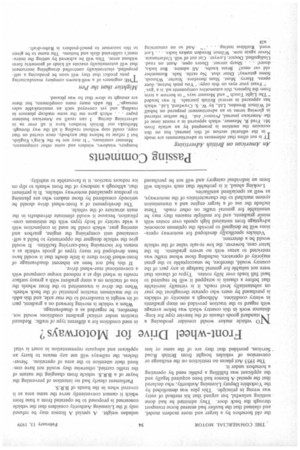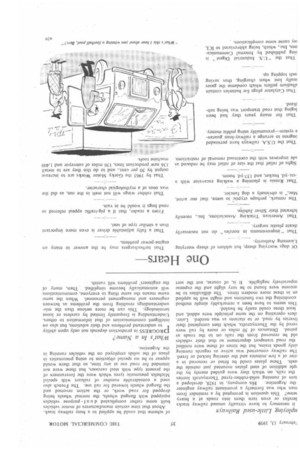Passing Comments
Page 36

Page 37

If you've noticed an error in this article please click here to report it so we can fix it.
An American on British Advertising
IT is not often that references to advertisements are made in the editorial section of this journal, but on this occasion the mention is prompted by an article from Mr. Fred R. Messner, which appeared in a recent issue of the American journal, Printers' Ink. The author referred in glowing terms to an advertisement prepared on behalf of Wilmot Breeden, Ltd., by W. S. Crawford, Ltd., which has appeared in several British journals. It was headed " The Light Touch" and Messner says "to borrow a term from the hipsters, this automotive components ad. is a 'gas.'
" Feast your eyes on this copy: 'You push button, door opens. Hurry. Must. Slam therefore. Starter. Whoosh. Some getaway! Door shut. No rattle. Safe. Remember old car once? Brass knobs. All admire. But locks, doors! . . . Sharp corner. Doors open. Aunt on road. Undignified. Doctor, Lawyer. Cut out of will. Unfortunate. Never again now. Wilmot Breeden makes locks. .. . Last word. Ruthless testing. . . ' " And so on concerning R28 bumpers, windows, winders and some other components.
Messner continues, "It may not be the King's English. but I refuse to believe that anybody, once started on that copy, could stop without reading it all the way through. Methinks our British brothers have it all over us in advertising daring. I can recall no American business paper . . . which gave me the same madcap pleasure in reading, and yet conveyed such an unmistakable sales message." He adds many more compliments, but these are enough to show that he was pleased.
Mightier than the Pen
THE engineers of a well-known company manufacturing
pens predict that they will soon be producing a selfpropelled, electronically controlled draughting instrument that will automatically execute all kinds of geometric form without error. This will be achieved by setting the instrument's calibrated dials and buttons. The name to be given to this successor to pencil-pushers is Robo-draft.
nploying Little-Used Railways
it necessary to leave virtually unused railway tracks ierelict or even turn them into roads at a heavy )ense? This question is prompted by a reminder from man who was formerly a prominent railway engineer the Argentine. His company, in 1928, developed a tern of running solid-rubber-tyred Thornycroft lorries the rails, on which they were guided merely by the iple addition of steel plates mounted just outside the ieels. These plates could be fitted or removed in a Ater of a few.minutes and the steering locked or freed. The railway concerned was active as regards running iinly goods trains, but the times of these were notified the road transport department so that their vehicles tild be removed from the rails on to the roads as wired. Distances of 50 miles or more by rail were vered by the Thornyerofts. which then completed their liveries by road, or to stations as was needed. Later, Hers operating on the same principle were added, and least three could easily be hauled.
This seems to have been a remarkably simple method combining the two functions and might well be applied en in these more modern times. The difficulties to be ercome were found to be very slight and the expense mparatively negligible. It is, of course, not the sort of scheme that could be applied to a busy railway track.
About that time certain manufacturers of motor vehicles built some rather complicated d u alpurpose vehicles equipped with flanged wheels, the normal wheels being dropped for road work, or the action reversed and the flanged wheels lowered for rail use. The French also used a considerable number of railcars with special Michelin pneumatic tyres which were the forerunners of the present type with steel carcases, but these were not intended for road use at any time, so that there would appear to be no special objection to using pneumatics in place of the solids employed on the vehicles running in the Argentine.
What's In a Name?
PROGRESS in production depends not only upon ability to understand problems and their solutions, but also on intelligent communication of that information to others. Understanding is frequently limited by careless or loose terminology. This can be more serious than the misunderstandings resulting from the problems as between engineers and management personnel. When the same name means the same thing to everyone, communications will automatically become simplified. Then, many of the engineers' problems will vanish.
















































































































